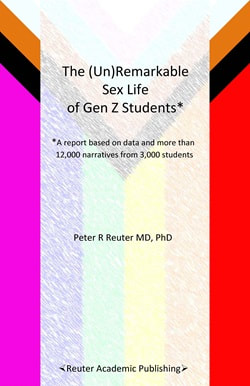The (Un)Remarkable Sex Life of Gen Z Students
Peter R Reuter, ISBN 9781734681130, 2024
Available for all standard ebook readers or as PDF! ebook ebook for Kindle PDF

“I have not been in any relationship with anyone. I have only had two sexual encounters, both only progressed to oral sex and that was it. Both occurred while I was 18 and the other person was my age or a year or two older than I.” (bisexual male, 18, sophomore)
Starting in 2016, the author collected data on the sexual behavior of college students. Over the course of seven years, more than 3,000 undergraduate and graduate students at a university in Florida participated in an anonymous online survey called ‘Why do students have sex?’. Quite extensive, the survey included a maximum of 91 questions that covered areas such as gender identity, sexual orientation, relationships and dating, use of drugs and alcohol, and their impact on students’ sex life, but also sexual coercion, harassment, and assault.
Stories have emotions; statistical data don’t. What enables this report to explore and lay open the sex life of Gen Z students in a unique way isn’t just having seven years’ worth of longitudinal data but the ability to use students' voices to explain their actions, thoughts, and feelings. Overall, students submitted more than 12,000 comments, explanations, or narratives of what happened, as well as their thoughts and emotions. Some were short and straight to the point, while others were almost short stories.
This report aims not to indoctrinate or push a particular agenda or ideology but to inform and educate. Gen Z has become kind of a common enemy for everyone else. There are complaints about their supposedly short attention span, over-reliance on technology, lack of resilience and toughness, but also their sense of entitlement and tendency to be overly passionate or extreme in their political and social views. In a way, that isn’t all that different from the complaints voiced by older generations in the past. What sets the current discussion apart, especially after the COVID-19 pandemic, is the vast gap between Gen Z and previous generations in their attitudes toward gender identity, sexual orientation, and sexual behavior. Mainstream American culture continues to resist acknowledging and granting the freedom to live authentic lives for those beyond the confines of the traditional male-female binary. This makes Gen Z’s acceptance of LGBT+ culture a thorn in the side of many opinion-makers in the media and politics.
Reading Dr. Reuter's report and the student narratives will take the readers on a journey of discovery. No matter where readers stand before they start reading, what generation they belong to, or what preconceived notions about Gen Z they have, everyone will have a better and more nuanced understanding of who Generation Z is once they reach the last page.
Starting in 2016, the author collected data on the sexual behavior of college students. Over the course of seven years, more than 3,000 undergraduate and graduate students at a university in Florida participated in an anonymous online survey called ‘Why do students have sex?’. Quite extensive, the survey included a maximum of 91 questions that covered areas such as gender identity, sexual orientation, relationships and dating, use of drugs and alcohol, and their impact on students’ sex life, but also sexual coercion, harassment, and assault.
Stories have emotions; statistical data don’t. What enables this report to explore and lay open the sex life of Gen Z students in a unique way isn’t just having seven years’ worth of longitudinal data but the ability to use students' voices to explain their actions, thoughts, and feelings. Overall, students submitted more than 12,000 comments, explanations, or narratives of what happened, as well as their thoughts and emotions. Some were short and straight to the point, while others were almost short stories.
This report aims not to indoctrinate or push a particular agenda or ideology but to inform and educate. Gen Z has become kind of a common enemy for everyone else. There are complaints about their supposedly short attention span, over-reliance on technology, lack of resilience and toughness, but also their sense of entitlement and tendency to be overly passionate or extreme in their political and social views. In a way, that isn’t all that different from the complaints voiced by older generations in the past. What sets the current discussion apart, especially after the COVID-19 pandemic, is the vast gap between Gen Z and previous generations in their attitudes toward gender identity, sexual orientation, and sexual behavior. Mainstream American culture continues to resist acknowledging and granting the freedom to live authentic lives for those beyond the confines of the traditional male-female binary. This makes Gen Z’s acceptance of LGBT+ culture a thorn in the side of many opinion-makers in the media and politics.
Reading Dr. Reuter's report and the student narratives will take the readers on a journey of discovery. No matter where readers stand before they start reading, what generation they belong to, or what preconceived notions about Gen Z they have, everyone will have a better and more nuanced understanding of who Generation Z is once they reach the last page.
